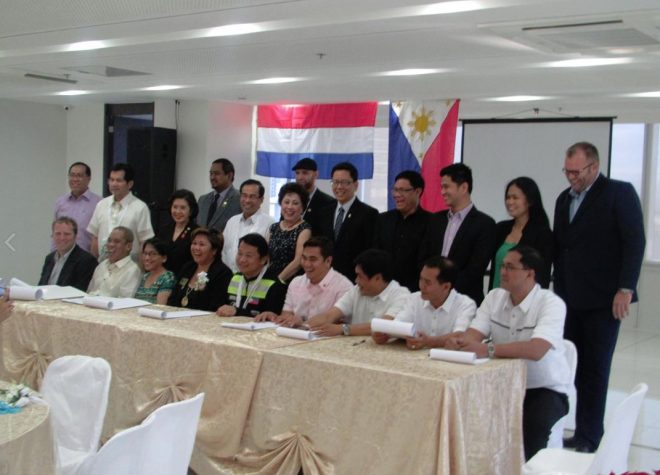City Climatescan Manila
(Mega)cities are confronted with problems caused by urbanisation and climate change, such as heat stress, drought, flooding, air and water pollution and poor sanitary conditions. The Hanze University of Applied Sciences, Groningen and the University of Applied Sciences Rotterdam took the initiative, together with various national and international partners, to set up city climatescan in Manila and Pateros. The climatecafe setting allows discussion on cost effective measures for the restoration of the heavily polluted Pasig River and deteriorated Pateros River in Manila.
An impression of the city climatescan Manila can be found at:
The objective of the programme is to restore ecological balance and prevent flooding and diseases from breaking out in those regions usually most heavily affected by natural or man-made disasters.
‘Living Lab Manila Flood Free 2016-2020’.
Climate change challenges require a multifunctional integrated approach, as applied in the climatecafe concept. Ten students from the Netherlands and three from the Philippines spent one week studying the issues in the Philippines under the supervision of Floris Boogaard (senior consultant at Tauw and professor Spatial Transformations at Hanze University of Applied Sciences in Groningen), Marius Palsma (Waterways), and Rick Heikoop (Rotterdam University of Applied Sciences). The working week was set up in line with the city climatescan concept: students work in groups in a ‘pressure-cooker setting’ on a practical urgent issue in an intensive and solution-oriented way within a short period of time.
Floating `sausage’ to stop plastic pollution
The students worked together with local parties on finding solutions for a polluted river in the Pateros district and for the frequent floods in Manila. The students came up with an innovative solution, the ‘Longganisa’ (sausage in Filipino). This idea can be used in many different international projects.
William van Niekerk (at that time Tauw Group Executive Board Member and Chairman of the Internationalization Topsector Water): ‘In the coming decades the greatest challenges for a sustainable world will be fighting the effects of climate change and urbanisation. The best sustainable solutions for these challenges can only be found by a multidisciplinary approach and involvement and participation of all stakeholders. This project is a good example of this.’
Sustainable innovation
The students gave their final presentations during a closing meeting with officials from the Philippines on 25 April 2016. The next group of students left for the Philippines in October 2016 after a national introduction consisting of a two-day ‘Delta cities – Lely in the 21st century’ Masterclass in collaboration with the Delta Talent Academy. This is where the innovative final product will be designed in detail prior to implementation in the polluted rivers of Pateros and in the Pasig River, and where international opportunities will be explored.
Marion Derckx, the Dutch ambassador in the Philippines: ‘Collaboration is most effective if it takes place at all levels: local, regional and national. And with a variety of stakeholders: knowledge centres, businesses, government and citizens. That is why this collaboration is an enhancement to our activities in the area of water management in the Philippines. If you combine different experiences and insights, you can generate new solutions. This contributes to truly sustainable innovation.’
Knowledge as an export product
All the collaborating parties can look back on a successful ‘Living Lab’. The various innovative end products will be shared at international conferences in the coming period. Floris Boogaard: ‘I am proud of the wonderfully innovative end result achieved by the students in this multidisciplinary international collaboration. These new ‘champions of change’ are capable of handling multidisciplinary projects with limited resources such as money and time. They are a valuable addition to one of the most important export products of the Netherlands: ‘technical knowledge’, and this is something we can be all very proud of.’
More info on this climatecafe Manila: https://www.climatescan.nl/projects/343/detail
